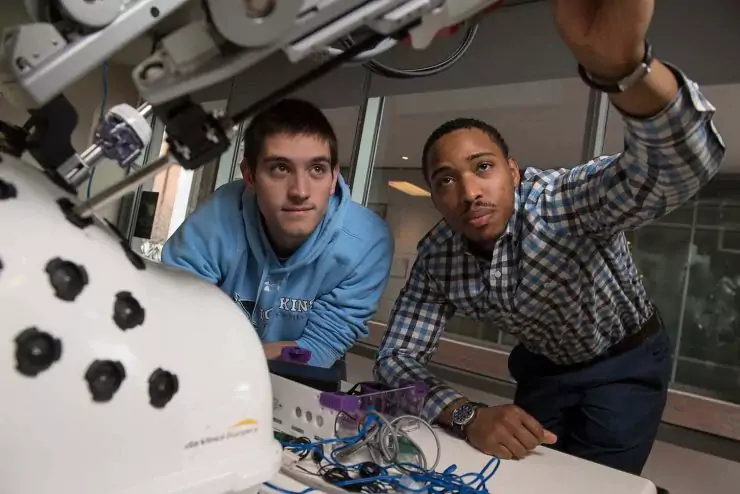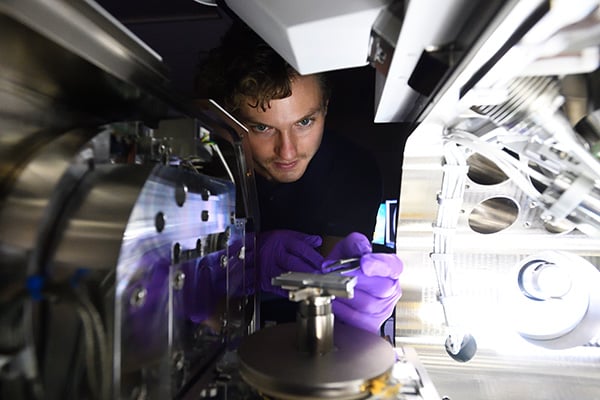Request More Information
Get a walkthrough of the application process, learn how to find an advisor, and get your questions answered.
We respect your privacy. Submitting this form constitutes your express written consent to receive emails, phone calls, text messages and/or other media from Johns Hopkins University at the phone number(s) or email(s) received, including a wireless number(s). These emails, texts, calls, or other media may be generated using automated technology. You may opt out of receiving any of these communications at any time. You are not required to provide this consent to receive services from Johns Hopkins University.
Advance Without Stepping Away
Earn your doctorate while staying fully engaged in your job.
Real Research, Real Impact
Tackle high-value projects that solve real challenges in your organization.
Built on True Collaboration
Work closely with Johns Hopkins faculty from start to finish.
Elevate Your Role and Reach
Position yourself—and your company—at the forefront of engineering innovation.
The Advanced Technical Expertise to Succeed
The Doctor of Engineering (DEng) at Johns Hopkins University is a non-residential, remote program designed for working engineers and scientists. Stay embedded in your job while conducting advanced research that directly addresses challenges at your company.
The DEng program offers a doctorate degree and career growth for you, impactful solutions for your company, and a stronger bridge between industry and innovation.

Doctor of Engineering vs a PhD: What’s the Difference?
The DEng is designed for mid-career professionals who already have a master’s degree and significant experience in the field. PhD programs typically admit early-career students with a bachelor’s degree.
DEng students aim to grow as technical leaders in industry or the public sector. PhD students are often preparing for academic or research roles.
The DEng is non-residential so students can work on their project at their employers. PhD students generally attend on campus and pursue their studies full-time.
The DEng takes about three years to complete, offering a shorter, more focused timeline than the average five-year PhD
Instead of a traditional dissertation, DEng students complete a portfolio of work—such as prototypes, simulations, design documents, or patent applications—that demonstrates applied problem-solving.
Benefits to Employers
The Doctor of Engineering program at Johns Hopkins is built to deliver real impact—and ROI—for the student AND their employer. By supporting an employee through this applied, research-focused degree, companies gain direct solutions to real engineering problems. The work is grounded in challenges a company is already facing, with results that can be put to use.
Partnering with Hopkins Engineering gives an organization access to expert faculty who bring fresh thinking and deep technical knowledge. This collaboration strengthens in-house capabilities and helps tackle complex challenges with new tools and perspectives.

Backing a Doctor of Engineering candidate shows commitment to innovation and talent development.
It boosts retention, builds leadership from within, and helps keep an organization ahead of the curve in a fast-changing industry.
Frequently Asked Questions
How is the DEng different from a PhD???
The Doctor of Engineering (DEng.) offers the same depth and rigor as a traditional PhD, but is tailored for experienced professionals. Unlike PhD students, who begin with years of coursework, DEng applicants must already hold a master’s degree—allowing them to dive straight into advanced, applied research.
Early in the program, students complete an oral exam based on focused, advisor-guided study rather than formal classes. Both DEng and PhD students go on to develop a full research proposal and spend the final two years conducting original research, leading to a public defense.
What prerequires are there required to enter the DEng program?
Prospective students must have:
– A master’s degree in a related field
– Significant professional experience
– Identified a project (one that requires multi-year, doctoral-level research) that is of importance to you and your employer
– Employer support for the research, time commitment, and tuition costs of the DEng program
– Secured a faculty advisor and co-advisor at their place of employment
What is DEng tuition and who pays?
The annual program fee must be paid by the student’s employer and covers expenses associated with the research (notably, the faculty mentor), as well as any courses the student takes.
In 2024-2025, DEng tuition was $66,950 annually / $33,475 a semester.
Who are allowed to act as my advisors?
Students are responsible for identifying and securing the support of a primary advisor in the Whiting School as well as a co-advisor at their place of employment. All tenure-line faculty (Assistant, Associate, and Full Professors) as well as Research Professors are eligible to be faculty advisors. Your employer co-advisor should hold a PhD or DEng in a technical discipline relevant to the project. It may not be someone who reports directly or indirectly to you.
I’m interested, and I think my employer would be, too. What’s the next step?
Fill out the form above for more information and to register for an upcoming webinar with Dr. Ashutosh Dutta, DEng program director.
Request Free
Program Info
We respect your privacy. Submitting this form constitutes your express written consent to receive emails, phone calls, text messages and/or other media from Johns Hopkins University at the phone number(s) or email(s) received, including a wireless number(s). These emails, texts, calls, or other media may be generated using automated technology. You may opt out of receiving any of these communications at any time. You are not required to provide this consent to receive services from Johns Hopkins University.

© 2024 Johns Hopkins University. All rights reserved.
Contact Us
Johns Hopkins Whiting School of Engineering
3400 North Charles Street
Baltimore, MD 21218


